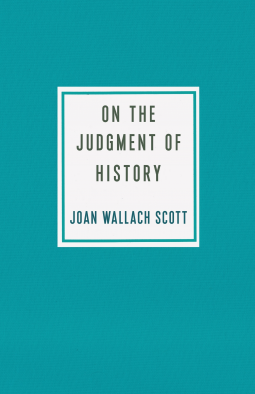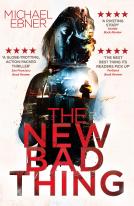
On the Judgment of History
by Joan Wallach Scott
This title was previously available on NetGalley and is now archived.
Send NetGalley books directly to your Kindle or Kindle app
1
To read on a Kindle or Kindle app, please add kindle@netgalley.com as an approved email address to receive files in your Amazon account. Click here for step-by-step instructions.
2
Also find your Kindle email address within your Amazon account, and enter it here.
Pub Date Sep 22 2020 | Archive Date Dec 30 2020
Talking about this book? Use #OntheJudgmentofHistory #NetGalley. More hashtag tips!
Description
Joan Wallach Scott critically examines the belief that history will redeem us, revealing the implicit politics of appeals to the judgment of history. She argues that the notion of a linear, ever-improving direction of history hides the persistence of power structures and hinders the pursuit of alternative futures. This vision of necessary progress perpetuates the assumption that the nation-state is the culmination of history and the ultimate source for rectifying injustice. Scott considers the Nuremberg Tribunal and South Africa’s Truth and Reconciliation Commission, which claimed to carry out history’s judgment on Nazism and apartheid, and contrasts them with the movement for reparations for slavery in the United States. Advocates for reparations call into question a national history that has long ignored enslavement and its racist legacies. Only by this kind of critical questioning of the place of the nation-state as the final source of history’s judgment, this book shows, can we open up room for radically different conceptions of justice.
Available Editions
| EDITION | Other Format |
| ISBN | 9780231196956 |
| PRICE | $25.00 (USD) |
Average rating from 7 members
Featured Reviews
American historian Joan Wallach Scott (° 1941) earned her spurs in gender historiography, but in these Ruth Benedict lectures, at Columbia University, she focuses on a very theoretical question, namely whether history has its own moral weight . With that she refers to phrases such as: "history will judge," or "we are on the right side of history." For her, that question became particularly topical after Donald Trump took office in the US and racist and extremist right flared up; had history not clearly referred these movements to a dark and uncivilized past? For sure, an interesting question!
In these lectures, she ventures into an analysis of 3 moments in the 20th century in which the 'judgment of history' was formally invoked: the Nuremberg Tribunal in 1946, the Truth Commission in South Africa in 1996 and the movement for compensation of slavery in the United States. She offers a very critical analysis of those moments, which she says could not substantiate that moral weight of history because they followed too much the logic of the nation-state. In an epilogue Scott sketches the contours of a new philosophy of history, distancing herself of linear, progressive historiography. More about this in my History-account on Goodreads: https://www.goodreads.com/review/show/3334032860.
 David W, Media/Journalist
David W, Media/Journalist
Barack Obama, among others, likes to accuse people of being on the wrong side of history. As if history is some sort of self-correcting gizmo where truth always rises to the top. This is of course complete nonsense, and Joan Wallach Scott’s book On The Judgment of History proves it by examining three major attempts to actively get on the right side of history.
She picked the Nuremburg Trials, South Africa’s Truth and Reconciliation Commission (TRC) and the current attempts to wring reparations for blacks out of the US government. In every case, history has been twisted, abused, ignored and sometimes just plain sidelined. The results are always disappointing. Both of history and of this book.
In Nuremburg, allied lawyers spent countless days slicing and dicing words and concepts, as lawyers always do. They questioned whether Germany was actually a nation-state and whether the National Socialists were actually a political party. They of course pontificated on the morals or lack thereof in a genocide of Jews, without the slightest sense of irony or hypocrisy, because all of their countries had done something similar, if not to Jews then to natives or other ethnics or homsexuals. But history is written by the victors, and history’s “judgment” is therefore quite worthless.
In South Africa, the TRC became a self-purge of guilt under the commission’s leadership of Bishop Desmond Tutu. It was designed to be a national, collective self-reckoning, but degenerated into lurid confessions by individuals to ask forgiveness from other individuals. No one was prosecuted and no new laws were born from its loins. Did the nation heal from all this bleating? Many think not.
And in the USA, calls for reparations for hundreds of years of slavery followed by hundreds of years of discrimination have led precisely nowhere, as blacks are still far behind in social and economic terms. New generations of blacks are discovering their more recent ancestors also called for reparations, as they suffered similar indignations and insults, not to mention discrimination and death. White supremacy is still on the right side of history, it seems.
So history is not the truth filter many like to claim, and it is just a cop-out, a way to avoid dealing with a crime, a rogue, a bigot or a criminal. Barack Obama in particular, should be ashamed.
Scott’s book is a written version of a lecture series she gave. She is a historian of renown, but the book is sadly flat and uninspiring, often just snippets of quotes from her research. I could find no great insights of hers to repeat, and nothing quotable to impress readers here. What she says has to be self-evident to students of history. For the rest of us, it is pretty obvious anyway.
David Wineberg
TL;DR
On the Judgment of History by Dr. Joan Wallach Scott shows us that though the actions of history may be settled, the lessons are never finished. Recommended.
Disclaimer: The publisher provided a free Advanced Reading Copy of this book in exchange for an honest review.
Review: On the Judgment of History
Since 2016’s election, the number of times I’ve heard the phrase “history will not judge _______ well” (or some variation) has skyrocketed. It seems to come up once a week while scrolling through social media. The idea that history will provide comeuppance for crimes committed now is one that many people, including myself, cling to for hope. But is it true? Does history provide an outlet for justice? Dr. Joan Wallach Scott investigates that question in her book On the Judgment of History, which is part of the Ruth Benedict Book Series from Columbia University Press. Dr. Scott’s launching point for this study was Nazi’s marching on Charlottesville. She asks a question that I think many people asked themselves. Hadn’t the nazi ideology been defeated and thoroughly repudiated after World War II? To answer this question, Dr. Scott looked at attempts (or lack thereof) to reconcile three of history’s biggest atrocities: the Nuremberg trials after World War II, the Truth and Reconciliation Commission of South Africa, and reparations for slavery in the United States. Dr. Scott’s investigation is inciteful, elegant, yet not comforting. But harsh truths are truths nonetheless, and On the Judgment of History has a lot of truth in it.
The introduction of On the Judgment of History states that this book came from a series of lectures that Dr. Scott gave for the Ruth Benedict Lectures at Columbia University. I would have loved to sit in on one of those lectures. (I haven’t looked for them on YouTube.) As stated earlier, this book looks at the aftermath of three of history’s biggest atrocities: the Nuremberg trials, the Truth and Reconciliation Commission of South Africa, and reparations for slavery in the United States. As one would imagine of a book based on a lecture series, this is an academic book. Dr. Scott peppers the text with quotes and references. The writing is very analytical and academic focused, but there is plenty to learn and enjoy for hobbyists like me.
There are three sections of this book, and each fit together wonderfully. Dr. Scott ties them into a unifying whole in a very satisfying way. Though slight in pages, this book contains depth. It made me more curious about the Nuremberg Trials, and I learned so much about the reparations movement.
The Nuremberg Trials
Dr. Scott’s analysis of the Nuremberg trials shifted my perspective. She noted that the goal was to establish the Nazi crimes so that they and their ideas were politically and morally out of bounds forever. Dr. Scott noted that the trial was careful to separate individuals and the state. For example in the opening address, Robert Jackson said, “Of course, the idea that a state, any more than a corporation, commits crimes is a fiction. Crimes always are committed only by persons.” Jackson worried about legal issues for a nation’s sovereignty. Yet he often drifted back between the Nazi state as a nation to an organized criminal organization. Dr. Scott’s analysis is excellent. She notes that Jackson’s balancing act erases the German’s who resisted the Nazis while trying carefully to avoid punishing the Nazi state in such a way that the U.S. treatment of African-Americans could be called into question. So, Jackson and others made the violation of other nation’s sovereignty into the key issue.
Does this section on the Nuremberg trials and their documentation of Nazi horrors vindicate the question of whether History redeems the deeds of the past or at least instructs us to prevent them from happening again? I say no, and I think Dr. Scott would as well. Put aside the fact that Holocaust Deniers exist and grow online; set aside the fact that Nazi extremism is loud and proud in the Trump years; look at the trial itself. Nuremberg served as a way for ‘good’ nations to distinguish themselves as law abiding, and it prescribed racism to Nazi extremism.
South Africa's Truth and Reconciliation Commision
Dr. Scott opens this section with a beautiful quote from Jacques Derrida, “One could never, in the ordinary sense of the words, found a politics or law on forgiveness.” The Truth and Reconciliation Commission sought to document the crimes of apartheid; it focused not on retribution but reconciliation better known as forgiving. Her focus here is the interplay of Kader Asmal and Bishop Desmond Tutu. Asmal wanted to assign responsibility for past crimes while recognizing the role of dissenters in changing the system and, ultimately, change the system such that it didn’t happen again. He sought to create a collective change while Tutu focused on individual responsibility. Tutu’s focus on forgiving healed the individual without giving political agency to those who had to forgive. More often than not, forgiveness would be required of unpunished injustices.
Does this section demonstrate that History provides accountability? Again, I’d say no. There is a human need for justice, and forgiveness, when compelled externally, is not justice. Forgiving someone who has transgressed you is an individual act that must come from within. While it is often healing, the act only heals when the person chooses it on their own. While apartheid’s crimes are recorded and deemed unacceptable for history, it likely did little for individuals as racism, hurt, anger, and loss of life do not go away upon forgiving.
The quote that Scott opens the chapter highlights something I’ve been thinking a lot about lately as a U.S. citizen. The U.S. thinks of itself as a law and order nation, and we are quick to punish. Our politics and our laws have nothing to do with forgiveness, maybe less to do with justice. We, Americans, yes, I do include myself, are loath to forgive. We are quick to throw people in jail or, at least, to call for their jailing. This is not unique to one party or the other. We as a nation require punishment, and acts of forgiveness become astonishing. I remember after the murder of Daniel Pearl that his father forgave the terrorists. It was unthinkable that a father could forgive the murderers of his son. I couldn’t understand it, and I’m not sure I could have ever been that strong. But I think about it a lot as I see both lefties and righties call for the jailing of their political opponents. Will we ever be smart enough to forgive and find balance?
U.S. Slavery Reparations
The section on reparations caught my interest the most. It states plainly that the U.S. has never dealt with slavery in a meaningful fashion. We try to bury it in the past without any thought as to how it affects us today. Dr. Scott quotes Ta-Nehisi Coates here. (Rightly so, please, read The Case for Reparations. It’s a beautiful argument for reparations. Her discussion on debt as another means of imposing a quasi-slavery is excellent. Reparations could be thought of as a demand for lost earnings. Yet the U.S. will not be introspective about slavery. While Germany reckoned with its history and moved on, the U.S. trots merrily along thinking slavery and racism ended with the Civil War, and that everyone in the U.S. is equal. Reparations requires an admission of guilt that a shockingly high number of Americans will not recognize. While Dr. Scott lists the positive and negatives from Reconstruction to the present, she notes that these do little to dismantle the systematic inequality between whites and blacks in the U.S. I found this to be a powerful section on a topic that we will never move past without discussing as a nation.
This section also highlights how historians are continually revisiting the past and reinterpreting in the light of new findings, of new stories. Too often, we treat history as a story with a beginning and end, but it’s not that way. As Dr. Scott says, there is no one story to be told that is history. This is the section where the evidence is conclusive that history can fail to hold nations accountable for past horrors. One example that she uses is John Conyer’s HR 40 bill to study the effects of slavery on contemporary African-Americans. Year after year, congress failed to even bring the bill to a vote. Slavery continued through poll taxes, lynching, Jim Crow laws, etc.
Obviously, this section shows that History doesn’t provide justice for the acts of slavery. In the U.S., history is used to pave over those horrors. Hell, history books in Texas and elsewhere list slavery near the bottom of reasons for the Civil War, and the Lost Cause is still alive and well in the South. It took an HBO show – The Watchmen, worth your time – to educate most of America about the bombing of black wall street. A new HBO show – Lovecraft Country – looks to educate many Americans on sundown towns. History for the average U.S. citizen is more about the myth of American exceptionalism than dealing with our nation as a whole.
So, Is There Comfort in the Historical Record?
Now for the bad news, if one is looking to be comforted by the idea that history is a moral force that motivates the powerful or rights the wrongs of the past, I don’t think you’ll find it here. I didn’t. But this just means that we need to act now. Instead of being complacent and waiting for history to judge, we should judge. We should act to right the wrongs ongoing in our time.
Conclusion
Joan Wallach Scott’s On the Judgment of History is a complex look at how humanity responded to three of history’s greatest crimes. Dr. Scott shows that history isn’t a tool for justice. History doesn’t have a single story; there’s no plot arc. History is simply a tool for learning, and it’s up to us to use that knowledge to better ourselves and our nation.
7 out of 10!















